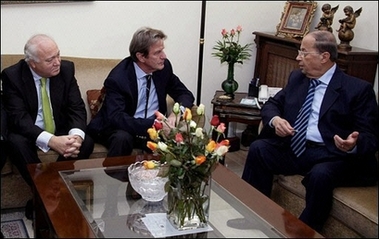 Beirut – Rival Lebanese leaders strived on Thursday to finalise a deal to have the army chief elected as president, but problems over amending the constitution persisted, despite the intervention of the French foreign minister. Parliament is due to convene Friday to elect a president. Army commander general Michel Suleiman has emerged as a candidate acceptable to the rival camps.
Beirut – Rival Lebanese leaders strived on Thursday to finalise a deal to have the army chief elected as president, but problems over amending the constitution persisted, despite the intervention of the French foreign minister. Parliament is due to convene Friday to elect a president. Army commander general Michel Suleiman has emerged as a candidate acceptable to the rival camps.
opposition leader General Michel Aoun,wants guarantees that his share of seats in the new cabinet will reflect the size of his parliamentary bloc – the biggest of any Christian faction. Aoun said Thursday that "the political vacuum in the country does not scare us" and reiterated that he wants political understanding before amending the constitution. Aoun reiterated he would only endorse Suleiman for two years until the 2009 parliamentary elections, and blamed the ruling majority for the deadlock. "I have made enough compromises and I will add a new demand every day," Aoun told a news conference. The ruling majority "led us to the void. They thought that the void would scare us…but it does not scare us and the presidency will always be there," he said. "If not now, in a week, if not, in a month or in a year. The country will not be destroyed, more than this current government has been destroying it," said Aoun. Kouchner met separately with Aoun, opposition-aligned Parliament Speaker Nabih Berri and legislator Saad Hariri, who leads the parliament majority. The diplomat discussed "the current political crisis … and efforts to complete the presidential election," state-run National News Agency said.
Another leading member of the anti-Syria coalition, former President Emile Gemayel, also indirectly blamed Aoun for the latest haggling, saying that "some have almost brought us back to square one with impossible conditions."Gemayel, whose Christian right-wing Phalange Party backs Suleiman for president, urged a speedy presidential vote.
The anti-Syrian governing coalition declared its support for Suleiman on Sunday, dropping its opposition to a constitutional amendment needed to allow a senior public servant to become president.
Nabih Berri, parliament speaker, on Thursday met Saad al-Hariri, leader of the majority March 14 bloc, in the presence of Bernard Kouchner, France’s Foreign Minister.
But it seemed obstacles were still pending and observers believe Friday’s vote would be postponed because it could go ahead only if the majority coalition and the opposition agreed on a broad power- sharing deal, which would include a new cabinet being formed.
Meanwhile, a Western diplomatic source said that Kouchner was to leave Beirut later Thursday after failing to make the Lebanese leaders reach an agreement before the scheduled session on Friday.
According to the same source, a close aide of Italian Foreign Minister Massimo D’Alema was to arrive in Beirut later Thursday in a new attempt by European countries to help solve the deadlock.
Lebanon is without a president after six previous parliamentary sessions failed to secure a quorum to elect a successor to Emile Lahoud.
In the absence of a head of state, the government of Prime Minister Fouad Seniora has assumed the duties of the presidential office.
The presidential crisis is widely seen as an extension of the regional confrontation pitting the United States against Iran and Syria.



